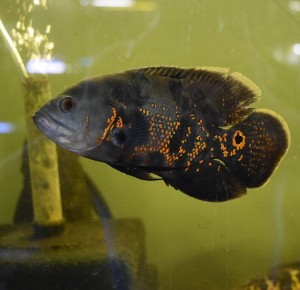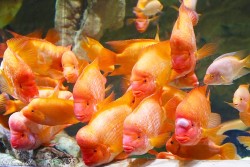Oscar Fish Feeding Guide
 As a large, carnivorous cichlid, the oscar fish Astronotus ocellatus requires a varied diet high in quality protein to thrive. Feed juvenile oscars 2-3 times daily and adults at least once daily. Offer a diverse mix of foods including large cichlid pellets and flakes, frozen or fresh meats like shrimp and krill, live insects, and occasional veggie matter like zucchini. Pellets or flakes should make up 50% of diet, with the rest supplemented by meaty foods for enrichment. Soak dry foods in tank water before feeding to prevent bloat. Feed only as much as oscars can consume within 2-3 minutes, and avoid overfeeding. Fasting 1-2 days per week helps maintain digestive health. Aim for feedings equal to around 2-3% of the oscar's body weight each day. With a combination of quality commercial Oscar foods and fresh meats, oscars will thrive on a diet that satisfies their large appetites.
As a large, carnivorous cichlid, the oscar fish Astronotus ocellatus requires a varied diet high in quality protein to thrive. Feed juvenile oscars 2-3 times daily and adults at least once daily. Offer a diverse mix of foods including large cichlid pellets and flakes, frozen or fresh meats like shrimp and krill, live insects, and occasional veggie matter like zucchini. Pellets or flakes should make up 50% of diet, with the rest supplemented by meaty foods for enrichment. Soak dry foods in tank water before feeding to prevent bloat. Feed only as much as oscars can consume within 2-3 minutes, and avoid overfeeding. Fasting 1-2 days per week helps maintain digestive health. Aim for feedings equal to around 2-3% of the oscar's body weight each day. With a combination of quality commercial Oscar foods and fresh meats, oscars will thrive on a diet that satisfies their large appetites.Unlocking the Secrets to Oscar Fish Care and Nutrition
Introduction
Oscar fish, scientifically known as Astronotus species have garnered immense popularity in the world of aquarium enthusiasts. Renowned for their endearing bug-eyed appearance and dog-like personalities, these remarkable fish offer a captivating glimpse into the intriguing realm of freshwater aquaria. Prepare to gain valuable insights and practical knowledge for successfully maintaining these beloved aquatic companions in your home aquarium.Wild Oscar Feasting: Nature's Culinary Symphony
Oscar fish originate from the tropical and subtropical regions of South America. In their natural habitats, wild Oscars primarily subsist on a diet of meaty fare, predominantly small whole fishes. Live insects and insect larvae also form a significant part of their daily sustenance. While precise percentages remain elusive, it is safe to assume that approximately 90 percent of a wild Oscar's diet consists of live fishes and insects.Additionally, wild Oscars occasionally diversify their menu with fruits, nuts, shrimps, and snails. Fruits and nuts are typically consumed seasonally. Some reports even suggest Oscars scavenging near deceased animals in water bodies, although the prevailing theory leans towards them feasting on the smaller fishes attracted to carrion.
Captive Oscar Dining: A Culinary Shift
The dietary habits of captive Oscars often deviate significantly from those of their wild counterparts. Many aquarium enthusiasts primarily offer two types of sustenance to their Oscar fish: live feeder fishes and specially formulated pellets tailored for larger aquarium species.Our experience suggests that Oscars thrive when offered a diverse array of foods that closely resemble their natural diet. Although replicating their wild diet entirely can be challenging, it proves both rewarding and surprisingly cost-effective in nurturing healthy Oscar fish.
Live Feeder Fish: The Thrilling Oscar Hunt
While live feeder fishes hold a significant place in the menu for predatory fish like Oscars, they should never constitute the sole source of sustenance unless it aligns with a specific breeding goal. The practice of feeding live fishes carries a risk of disease transmission, especially when using species like goldfish, which are often mass-produced. However, advances in the understanding of raising and transporting feeder fishes have reduced this risk considerably. Nonetheless, relying solely on live feeder fishes is not recommended.Insect & Worm Delicacies: Oscars' Tiny Tantalizations
During the rainy season, Oscars transition their diet towards insects and insect larvae. Small crickets and mealworms have proven to be excellent choices for Oscar fish. It is crucial to avoid insects exposed to chemicals like fertilizers or insecticides. Opt for farm-raised crickets, mealworms, and waxworms, readily available at local pet stores. Additionally, prepared insect options in canned forms have become accessible, making them a convenient dietary supplement for Oscars and other fish species. Check out Bug Bites Cichlid Granules specially formulated for the nutritional needs of cichlids.Fruits, Nuts, and Veggies: A Natural Oscar Buffet
In times of high water levels, Oscars turn to the fruits and nuts of tropical trees as part of their diet. While tropical nuts may not be readily available, offering one or two shelled nuts occasionally is a viable option. One particular vegetable that warrants special attention is frozen peas. Frozen peas have proven to enhance Oscar fish's coloration and vigor, making them a valuable addition to their diet. Feed them frozen for optimal results.Prepared Oscar Meals: Aquarium Cuisine Unveiled
Prepared foods such as pellets, tablets, crisps, flakes, and wafers are popular and easily accessible options for feeding aquarium fish. However, when feeding Oscars, caution is essential. Oscars tend to be messy eaters, and small food particles can lead to water quality issues.Tablets, wafers, and pellets are preferable to crisps or flakes, as Oscars tend to swallow them whole with less mess. Opt for prepared foods high in plant matter, as Oscars may lack these nutrients in their diet. Offering a variety of prepared foods, ideally half a dozen different types, ensures a balanced diet and vibrant coloration.
Fresh & Frozen Delights: Seafood Secrets for Oscars
Fresh or frozen seafood, such as shrimps, scallops, clams, and squid, serves as excellent additions to the Oscar fish diet. Offer these seafood options in moderation, as variety is key to success. While other frozen foods like brine shrimp, bloodworms, and mysis shrimp are suitable for small Oscars, their messy nature can pose challenges for larger fish. Stick to larger foods and adjust their size as needed.Quick Tips for Feeding Oscars
- Oscars are enthusiastic eaters, but moderation is key to their well-being.- Experiment with feeding schedules to determine the optimal frequency for your Oscar's age and size.
- Small Oscars (1½ to 3 inches) benefit from at least twice-daily feeding.
- Subadult Oscars (4 to 6 inches) continue daily feeding with occasional variations.
- Adult Oscars (7 to 8 inches and larger) require a balanced, varied diet, with moderation to maintain their weight.
- Oscars are interactive pets, so engage with them during feedings to monitor their intake and behavior.
- Maintain water quality, as Oscars can be aggressive towards tankmates.
